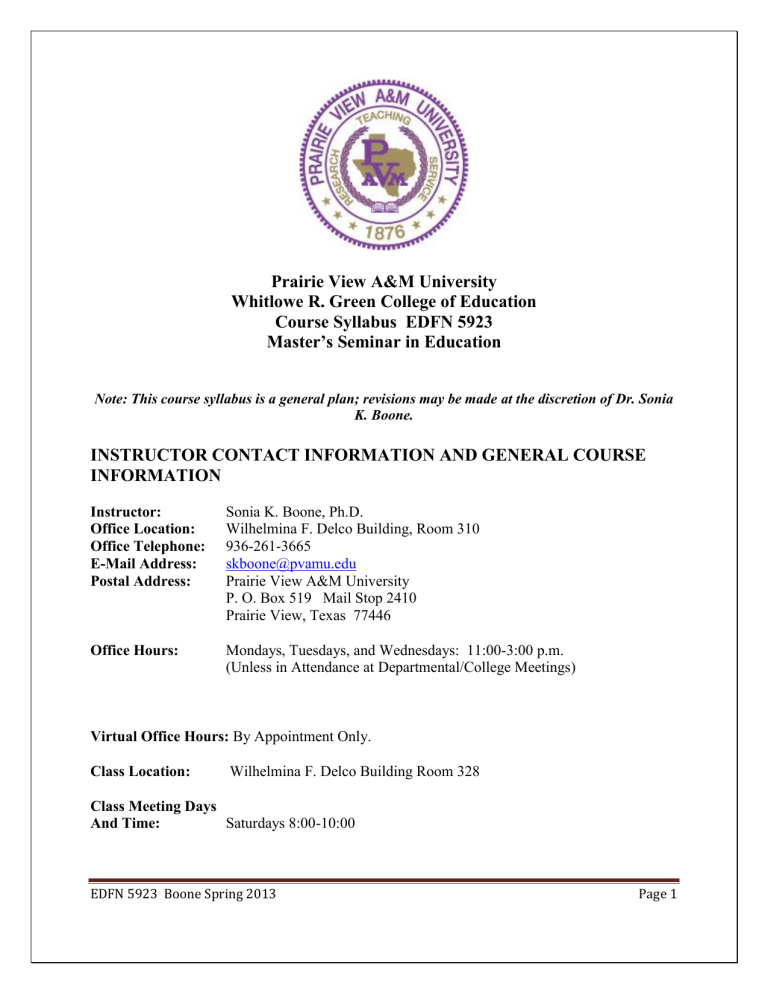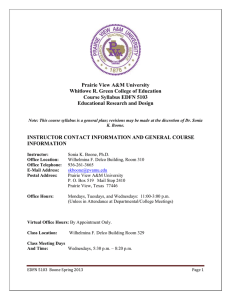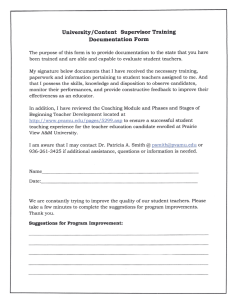Prairie View A&M University Whitlowe R. Green College of Education

Prairie View A&M University
Whitlowe R. Green College of Education
Course Syllabus EDFN 5923
Master’s Seminar in Education
Note: This course syllabus is a general plan; revisions may be made at the discretion of Dr. Sonia
K. Boone.
INSTRUCTOR CONTACT INFORMATION AND GENERAL COURSE
INFORMATION
Instructor: Sonia K. Boone, Ph.D.
Office Location: Wilhelmina F. Delco Building, Room 310
Office Telephone: 936-261-3665
E-Mail Address: skboone@pvamu.edu
Postal Address: Prairie View A&M University
P. O. Box 519 Mail Stop 2410
Prairie View, Texas 77446
Office Hours: Mondays, Tuesdays, and Wednesdays: 11:00-3:00 p.m.
(Unless in Attendance at Departmental/College Meetings)
Virtual Office Hours: By Appointment Only.
Class Location: Wilhelmina F. Delco Building Room 328
Class Meeting Days
And Time: Saturdays 8:00-10:00
EDFN 5923 Boone Spring 2013 Page 1
Course Web Support: This course is designated as a web-assisted course. Some class meetings will take place via web interaction, discussions, and assignments. For E-Course access please log on to www.pvamu.edu
.
Catalogue Description: EDFN 5923 Masters Seminar (3-0) Credit 3.
Investigation and analysis of research in the field of curriculum and instruction. Major paper a requirement for this course.
Prerequisites/Corequisites: EDFN 5103 > C.
Required Texts:
1.
Gay, L. R., Airasian P. Mills G. (2006). Educational Research: Competencies for analysis and application (9 th
ed.) New Jersey: Merrill.
2. American Psychological Association (2001). Publication manual of the American
Psychological Association (6 th
ed.) Washington, D.C.: Author.
**Other related texts and articles will be supplied by the instructor.**
Related Websites:
1.
www.tamu.edu/pvamu/library You may access this site for Test Taking Tips and
Reducing Test Anxiety . You may also reach the PVAMU Library at 936-261-1500 .
2.
www.bkstr.com/Home/10001-10734-1demoKey=d Please access this website for Access to PVAMU Learning Resources . You may also reach the University Bookstore at
936-261-1990.
Course Goals/Correlation to:
Conceptual Framework
Content Area and Pedagogy Standards for Texas Educators/TExES Content and
Pedagogy Responsibilities Examinations
NCATE
EDFN 5923 Boone Spring 2013 Page 2
Conceptual Framework
The PVAMU Conceptual Framework Model- Educator as Facilitator of Learning for
Diverse Populations (E-FOLD-P)- supports the major goals of the Teacher Education Unit.
E-FOLD-P guides the design and the implementation of teacher education programs located in the College of Education and constitutes a commitment by the Unit to develop and prepare candidates as:
Problem solvers, critical thinkers, and decision makers;
Reflective and continual learners who utilize effective teaching practices;
Facilitators of student growth and development, by precept and example;
Educators with understanding and appreciation of human diversity and global awareness.
Course Objectives/Outcomes
At the End of this course, students will be able to meet the following NCATE/TExES
Standards:
1.
Describe the nature and purpose of educational research, describe the types of research according to the general methodology classification scheme, identify the general activities in conducting a research study and describe the major sections of a research report.
2.
Identify the criteria for adequate hypotheses or research questions, identify types of variables, develop related hypotheses, identify necessary operational definitions, given a research problem statement, and identify the criteria for developing surveys, and questionnaires.
3.
Identify the reasons for conducting a literature review relative to a specific research problem, describe the activities of a Literature Review, implement the procedures for reviewing research literature, conduct a computer search of the literature relative to a
EDFN 5923 Boone Spring 2013 Page 3
specific research problem, use acceptable referencing formats, identify the characteristics which should be considered when evaluating a research report, evaluate research reports,
4.
Write a method section in a research report, explain the meanings of reliability and validity, identify the criteria for a good sampling design, describe the connection between representativeness and generalizability, and the role of random selection or random assignment of subjects, identify factors to be considered when determining sample size, and identify the criteria for developing surveys, and questionnaires.
5.
Define the commonly used measures of central tendency: mean, median and mode, and those of dispersion: variance, standard deviation, and range, describe the process of analyzing data through the use of a computer, assemble and summarize research information, identify the appropriate statistical tests given situations for which the tests apply, and use the appropriate statistical techniques for analyzing data and reporting results.
6.
Design and implement a complete research project on a research problem of interest, select and apply an appropriate format for preparing a research report, apply the correct format for writing a reference section, and evaluate journal articles and research reports.
Course Requirements & Evaluation Methods
This course will utilize the following instruments to determine student grades and proficiency of the learning outcomes for the course.
Exams – written tests designed to measure knowledge of presented course material
Exercises – written assignments designed to supplement and reinforce course material
Projects – web development assignments designed to measure ability to apply presented course material
Class Participation (Dispositions)
– daily attendance (includes absences and tardy arrivals to class) and participation in class discussions (includes professional dress)
Grading Matrix
Instrument Value (points or percentages) Total
Outside of Class/E Courses
Activities
In Class Participation,
Attendance, and
Dispositions
Revised Written Research
Document Inclusive of
200 points
100 points
200 points
200
100
200
EDFN 5923 Boone Spring 2013 Page 4
Chapters 1-3
Written Research Document
Inclusive of Chapters 1-5
Individual Presentation
With Power point of
Research Document
Inclusive of Chapters 1-5
Total:
300 points
200 points
300
200
1000
Points
Grade Determination:
A = 900-1000 points;
B = 800-899 points;
C = 700-799 points;
D = 600-699 points;
F = 599 and below.
Each assignment must be type-written according to APA standards and must include an APA formatted title page.
**Late Assignments will not be accepted.
Course Procedures
EACH STUDENT IS EXPECTED TO:
1.
Attend ALL class meetings (this includes arriving to all class meetings ON TIME).
2.
Remain in class for the entire class period, and when presentations are in progress.
3.
Purchase required textbooks.
4.
Bring your text book to class each day.
5.
Complete all required document downloads.
6.
Read and be thoroughly familiar with the course syllabus; follow directions for completing assignments!
7.
Read all supplementary handouts.
8.
Utilize all supplementary websites and web sources.
9.
Read and respond to all assigned case studies.
10.
Read the assigned text chapters prior to each class meeting .
EDFN 5923 Boone Spring 2013 Page 5
11.
Follow the instructions/requirements/guidelines and/or format provided by the instructor for completing all assignments, including E-Course/Out of Class
Activities, in class activities, written proposal assignment, written power point for proposal, and oral presentation for proposal.
12.
Utilize the required title page format for ALL submitted assignments.
13.
Type all assignments that are to be turned in to the instructor.
14.
Turn in all assignments (major and minor) on the assigned date. (LATE
ASSIGNMENTS WILL NOT BE ACCEPTED---NO EXCEPTIONS.)
15.
Take notes on class lectures and classroom discussions.
16.
Bring a Scantron® and a #2 pencil to take your tests and exams. Do not leave class to buy or borrow these items!
17.
Take all quizzes and mid-semester examinations for evaluative purposes.
18.
KEEP A COPY OF ALL ASSIGNMENTS SUBMITTED TO THE INSTRUCTOR,
INCLUDING RETURNED ASSIGNMENTS, AS WELL AS ANY OTHER
COURSE RELATED DOCUMENTS!
19.
Turn OFF all electronic devices – use only before or after class!
20.
Conference with the instructor, as needed, throughout the semester.
21.
MAINTAIN A PROFESSIONAL ATTITUTE AND PROFESSIONAL
APPEARANCE AT ALL TIMES!
Formatting Documents:
Microsoft Word is the standard word processing tool used at PVAMU.
If you are using other word processors, be sure to use the “save as” tool and save the document in either the Microsoft Word, Rich-Text, or plain text format.
Utilize the services of the Writing Center prior to submitting a major paper or project.
Follow the American Psychological Association (APA) writing guidelines for submitting all essays and/or papers. See the Purdue APA Formatting Style and Guide at the following website: http://owl.english.purdue.edu/owl/resource/560/01/ Also see this
Syllabus Appendix for a sample APA document.
When using Power Point for presentations, be sure to choose appropriate backgrounds, fonts, font sizes, graphics, and use hyperlinks as needed, and/or as required by the instructor.
EDFN 5923 Boone Spring 2013 Page 6
Use Power Point 2003 so that your presentation can be shown on PVAMU computer projection equipment.
To print out handouts from PPT for class distribution, always choose to print as a black and white handout, with two to four slides per page.
Disability statement (See Student Handbook):
Students with disabilities, including learning disabilities, who wish to request accommodations in class should register with the Services for Students with Disabilities (SSD) early in the semester so that appropriate arrangements may be made. In accordance with federal laws, a student requesting special accommodations must provide documentation of their disability to the
SSD coordinator
.
NOTICE OF EQUAL OPPORTUNITY
Prairie View A&M University does not discriminate on the basis of race, color, national origin, sex, disability, or age in its programs and activities. The following person(s) has been designated to handle inquiries regarding the non-discrimination policies:
Name: Renee R. Williams
Title: Equal Opportunity Compliance Officer/Title IX Coordinator
Institution: Prairie View A&M University
Office of Student Affairs & Institutional Relations
Address: P.O. Box 519: MS 1107
A.I. Thomas Building, St 013
Prairie View, Texas 77446
Telephone: 936-261-2123
Fax: 936-261-2138
Email: rrwilliams@pvamu.edu
Individuals requesting a disability accommodation should contact:
Name: Dr. Kay Norman
Title: Administrator for Diagnostic Testing and Disability Services
Institution: Prairie View A&M University
Email: kfnorman@pvamu.edu
IMPROPER ACADEMIC CONDUCT, PLAGIARISM, AND ACADEMIC
DISHONESTY:
EDFN 5923 Boone Spring 2013 Page 7
Plagiarism is the theft of words, thoughts, and ideas.
Consult the PVAMU Undergraduate
Catalog for guideline and procedures related to plagiarism. Also see the web link listed below on Plagiarism - Frequently Asked Questions compiled by the Coleman Library staff. http://www.pvamu.edu/PDFFiles/Library/Ref/Plagiarism_FAQ.pdf
Academic Dishonesty for this class includes:
1.
Copying from another student’s test or exam, taking an exam for another student, or collaborating with another student(s) during an exam.
2.
Signing the roll for another student, or related misrepresentation.
3.
Using materials during a test that have not been authorized by the instructor giving the exam.
4.
Failing to credit sources used in a work or product in an attempt to pass off the work as one’s own (Plagiarism is the theft of words, thoughts, and ideas.)
5.
Attempting to receive credit for work performed by another, including papers obtained in whole or in part from individuals or other sources.
6.
Attempting to receive credit in one or more classes for the same paper or project without written approval of instructors involved.
Nonacademic misconduct (See Student Handbook)
The university respects the rights of instructors to teach and students to learn. Maintenance of these rights requires campus conditions that do not impede their exercise. Campus behavior that interferes with either (1) the instructor’s ability to conduct the class, (2) the inability of other students to profit from the instructional program, or (3) campus behavior that interferes with the rights of others will not be tolerated. An individual engaging in such disruptive behavior may be subject to disciplinary action. Such incidents will be adjudicated by the Dean of Students under nonacademic procedures.
Sexual misconduct (See Student Handbook):
Sexual harassment of students and employers at Prairie View A&M University is unacceptable and will not be tolerated. Any member of the university community violating this policy will be subject to disciplinary action.
EXAM POLICY
Exams must be taken as scheduled by the instructor . Makeup examinations will NOT be allowed except under documented, extreme emergencies (See Student Handbook).
PLEASE READ AND BECOME FAMILIAR with the UNIVERSITY ATTENDANCE
POLICY, INCLUDING THE FOLLOWING:
EDFN 5923 Boone Spring 2013 Page 8
EXCUSED ABSENCES – Absences due to illness, attendance at university approved activities, and family or other emergencies constitute EXCUSED ABSENCES and must be supported by documentation presented to the instructor prior to or immediately up the student’s return to class
. Students are responsible for all oral and written examinations as well as all assignments (projects, papers, reports) whether absence is Excused or
Unexcused.
UNEXCUSED ABSENCES – accumulation of 3 unexcused absences (for the number of clock hours equivalent to the credit for the course) constitutes excessive absenteeism . The instructor is not required to accept assignments as part of the course requirement when the student’s absence is UNEXCUSED.
Attendance Policy For EDFN 5103 Spring 2013:
Prairie View A&M University requires regular class attendance. Excessive absences will result in lowered grades. Excessive absenteeism, whether excused or unexcused, may result in a student’s course grade being reduced or in assignment of a grade of “F”. Absences are accumulated beginning with the first day of class.
Attendance is included in the final overall grade .
For the purposes of this course, three (3) absences will result in the lowering of the student’s grade by one letter, and four (4) absences may constitute an automatic grade of “F” for the course. After three (3) excused absences, it is up to the discretion of the professor as to whether or not subsequent absences will result in any grade deductions.
Habitual tardies will be counted as absences (The first three tardies will count as an absence, at the point that there is a fourth tardy will indicate that a conference with Dr. Boone is needed to determine whether or not it would be expedient to continue in this class).
Specific Attendance Policies for This Course Include The Following:
Students are required to attend all class meetings.
In order for an absence to be taken into consideration for being a valid “excused” absence, you must bring appropriate documentation to the instructor when you return from your absence.
Appropriate documentation includes official doctor’s excuses (for reasons of illness), court documents, etc.
No absences or tardies= 100 points
1absence= 75 points
2 absences= 50 points
3 absences= No points awarded
**Four (4) absences may constitute an automatic “F” for this course!**
EDFN 5923 Boone Spring 2013 Page 9
Student Academic Appeals Process
Authority and responsibility for assigning grades to students rests with the faculty. However, in those instances where students believe that miscommunication, errors, or unfairness of any kind may have adversely affected the instructor's assessment of their academic performance, the student has a right to appeal by the procedure listed in the Undergraduate Catalog and by doing so within thirty days of receiving the grade or experiencing any other problematic academic event that prompted the complaint .
WRITTEN ASSIGNMENT SPECIFICATIONS
ASSIGNMENT POINTS DUE DATES
Outside of Class/E
Courses Activities
Written Revised
Research Document
Inclusive of
Chapters 1-3.
200 Points Total
200 Points Total
OTHER
SPECIFICATIONS
These activities will be assigned at the discretion of the professor, and will be submitted through the
E-Course System on the assigned day between 7:00 a.m. and 11:59 p.m.
You will be responsible for completing a revised written document that is your research proposal.
This document will include chapters 1-3 of your research according to the checklist/rubric given to all students by the professor. This completed document must be submitted to the professor by the assigned deadline to be counted for a grade/point value.
Written Research
Document Inclusive of Chapters 1-5.
300 Points Total You will be responsible for completing a written document that is your research study. This document will include chapters 1-5 of your research according to the checklist/rubric given to all students by the professor. This completed document (along with the paper copy of your power
EDFN 5923 Boone Spring 2013 Page 10
Individual
Presentation
Inclusive of
Chapters 1-5
Research.
In Class
Participation,
Attendance, and
Dispositions
200 Points Total
100 Points point presentation) must be turned in at the same time that you will complete your Individual
Oral Presentation.
You will be responsible for completing a presentation that is inclusive of your research study of chapters 1-3.
This presentation is oral, and will be completed in the presence of your colleagues and the professor. You will utilize power point to complete this presentation. You will submit a paper copy of your power point presentation (as well as your written research study document) to the professor at the time of your oral presentation .
You will have a 20 minute time limit for your presentation.
This includes regular class attendance (see the section regarding attendance).
Also included here is participation (coming to class on time and staying in class for the duration), participating appropriately as to not distract other students from learning, and appropriate dress/attire (professional dress).
**CLASS CALENDAR OF TOPICS, EVENTS AND READING ASSIGNMENTS**
(This schedule is subject to change at the discretion of Dr. Boone.)
EDFN 5923 Boone Spring 2013 Page 11
Week
1
2
3
4
5
6
7
8
9
10
11
12
13
WEEK OF TOPICS AND EVENTS
Jan. 19, 2013 (Sat.) Overview of Syllabus and all related activities.
Research Document Chapter 1 and related activities.
Jan. 26 (Sat.)
Feb. 2 (Sat.)
Research Document Chapter 2 and related activities.
E Course Activity (Submission of Revisions of Chapters 1)
Feb. 9 (Sat.) E Course Activity (Submission of Revisions of Chapter 2)
Feb. 11 (Monday) Research Document Chapter 3 and related activities.
Feb. 18 (Monday) Research Document Chapter 4 and related activities.
Feb. 25 (Monday) Research Document Chapter 5 and related activities.
Midterm Week
March 4, 2013
(Monday)
E Course Activity (Submission of a draft of Chapters 3)
Please submit your
Chapter 1 revisions to
E-Courses between 7:00 a.m. and 11:59 p.m. today.
Please submit your
Chapter 2 revisions to
E-Courses between 7:00 a.m. and 11:59 p.m. today.
Please submit your
Chapter 3 revisions to
E-Courses between 7:00 a.m. and 11:59 p.m. today.
Spring Break
March 11-16, 2013
March 18 (Monday) E Course Activity (Submission of a draft of Chapters 4 and 5)
Please submit your
Chapters 4 and 5 Draft to E-Courses between
7:00 a.m. and 11:59 p.m. today.
March 25 (Monday) Review and wrap up of research document.
April 1 (Monday) E Course Activity or
Oral Individual Presentations of Research
April 8 (Monday) Oral Individual Presentations of Research
ASSIGNMENTS DUE
EDFN 5923 Boone Spring 2013 Page 12
14 April 15 (Monday) Oral Individual Presentations of Research and Final Class
Session
EDFN 5923 Boone Spring 2013 Page 13
Syllabus Contract
My signature below indicates that I have read, understand and agree to the conditions set forth in the Syllabus for
EDFN 5923 Master’s Seminar in Education.
I understand that :
The instructor will follow all policies listed in this Syllabus exactly as printed, including how my grade will be calculated.
End-of-course grade reports are final; however, it is my responsibility to inform the instructor via documentation of any errors in grade calculations prior to the final class meeting .
The instructor reserves the right to make changes to the syllabus at any time during the semester, and that
I will be notified promptly via my PVAMU University email of any significant changes.
Extra credit will not be given to improve my grade.
I am responsible for keeping track of my grades and asking the instructor, via email, if I am unsure of my current grade standing.
I am responsible for all course work, even if I do not attend class.
In accordance with the Syllabus, late assignments are not accepted.
It is my responsibility to request an appointment with the instructor after consulting with my class Support
Team if I am having difficulty with this course.
I will listen to my peer’s opinions and respect them, even if they differ from my own.
Time spent in class is valuable. Therefore, if the instructor thinks that I am disruptive in class, or that I have come to class unprepared, as directed by the instructor, I may be asked to leave and will comply.
I understand Prairie View A&M University’s Academic Integrity Policy, and I will be in compliance to the rules and procedures therein.
I am responsible for my own academic integrity and the integrity of my work.
If I have any questions about academic integrity, including proper crediting of sources or working cooperatively on an assignment, it is my responsibility to first check with my Support Team, then, if necessary, inform the instructor in an appropriate amount of time if my questions are not answered.
Furthermore, if I do not, I am fully responsible for my actions and any consequences.
I understand that a consequence for non-compliance to class policies and procedures may result in a reduction of, or a failing grade for this course.
___________________________________________________________ ______________________
Printed Name of Master’s Degree Candidate Last 4 digits of SID
PVAMU E-mail Address: __________________________________________________________________________
Personal Email Address: ___________________________________________________________________________
Phone: (Best contact number): _______________________________ 2nd Contact # _________________________
____________________________________________________________
Signature of Master’s Degree Candidate
____________________
Date
EDFN 5923 Boone Spring 2013 Page 14




